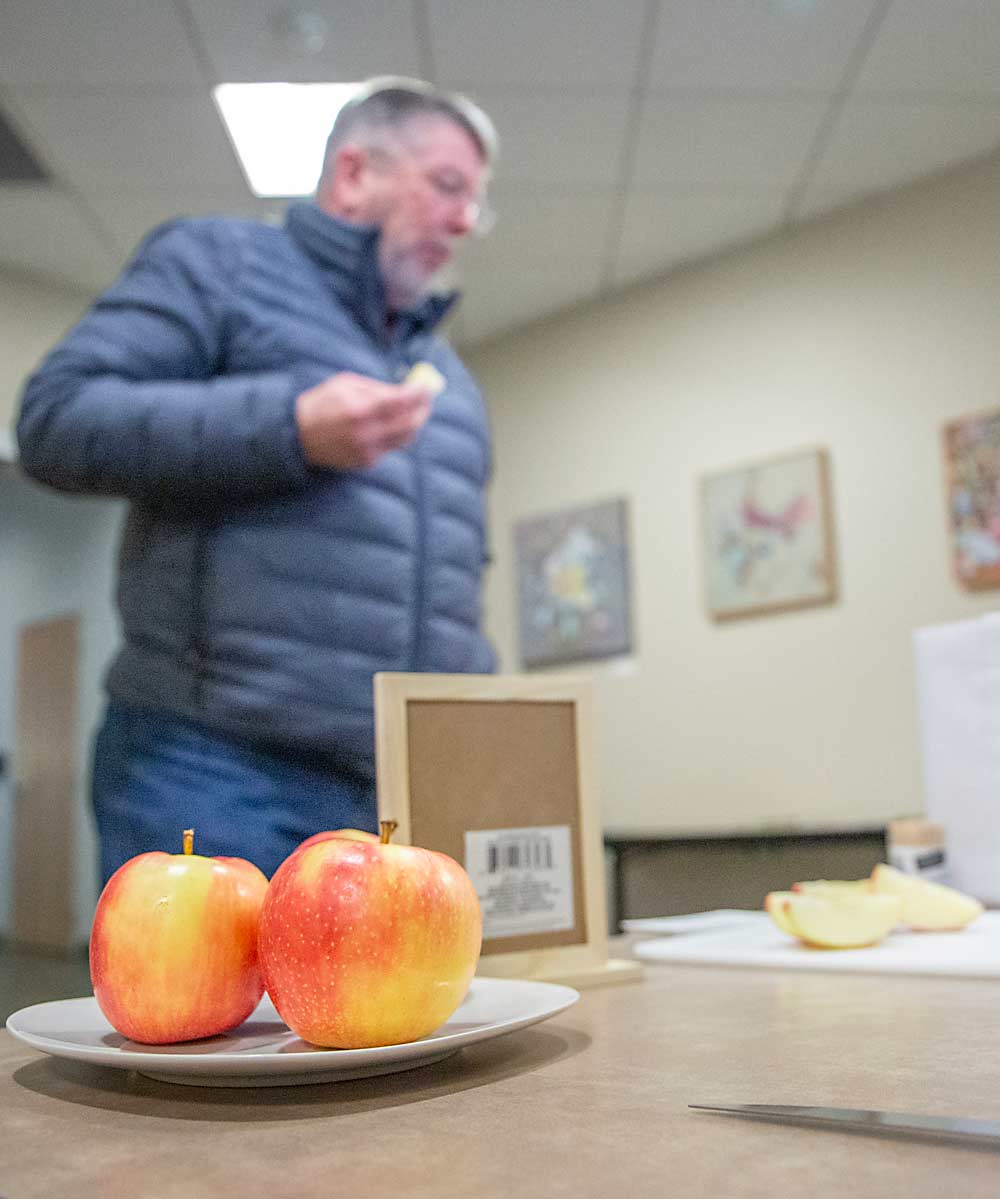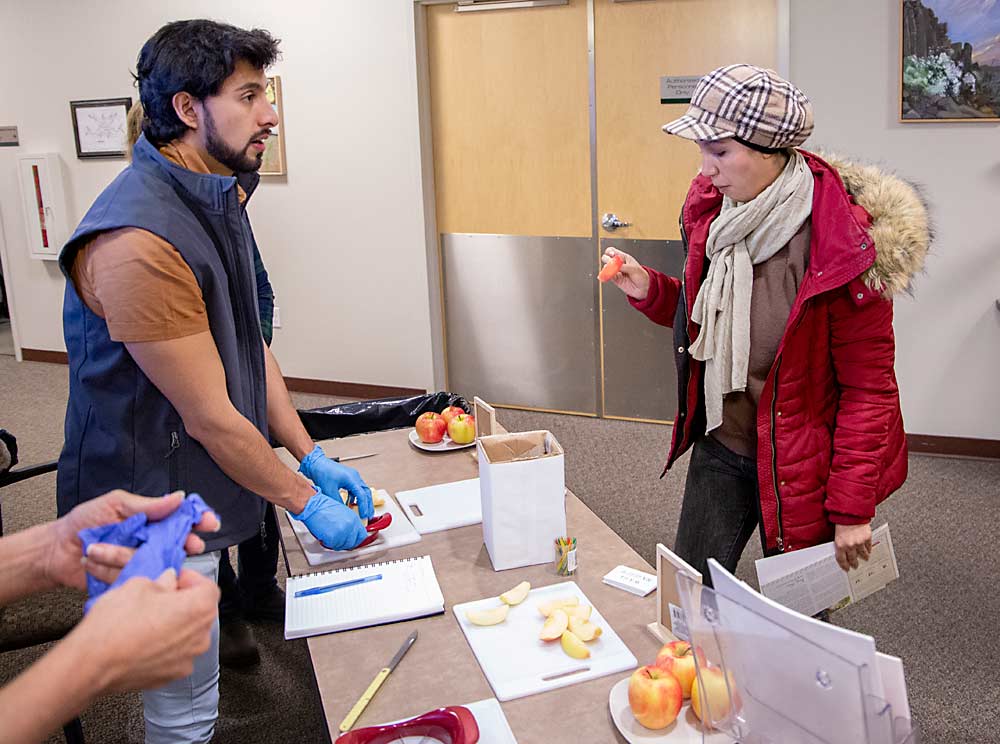
Washington State University wants to introduce growers to its newest apple, a Honeycrisp and Cripps Pink cross known as WA 64.
“It is more like a Cripps Pink in terms of firmness, but it has a better texture than Cripps. Its sweetness and acidity is between the two parents,” said Kate Evans, WSU’s pome fruit breeder who has been evaluating WA 64 for years. The cross was first made by her predecessor, Bruce Barritt, in 1998.
Consumers and industry members who’ve had a chance to taste the new cultivar — under the code name L in recent years, before its patent was secured late last year — rated it favorably against both of its popular parents, she said.
The cultivar should appeal to the same market as Cripps Pink, but it has the advantage of harvesting much earlier, between Honeycrisp and WA 38, said Ines Hanrahan, executive director of the Washington Tree Fruit Research Commission. It acts as an industry liaison to the breeding program and conducts independent evaluations of the advanced selections.
That involves growing enough fruit — from two blocks hosted by commercial growers since 2015 — to run the apple on packing lines and through storage programs to look for fatal flaws. They haven’t found any.
“What made WA 64 continue to advance is that it has some of the good attributes of Cosmic Crisp: It’s easy to color if exposed to light; it self-thins to singles and doubles; it’s slow to brown; and it retains its firmness almost to a fault,” Hanrahan said. It produces small to medium fruit size, peaking around 88s, with a signature pink cheek and has the potential to be a one-pick variety.
Growers will need to manage it for sunburn and mildew. And like any apple with Honeycrisp parentage, WA 64 can develop soft scald, but it’s much less severe, she said. It is not prone to bitter pit or internal browning. In ongoing trials, the commission and WSU researchers are working to dial in the optimum harvest timing and metrics.
The pandemic delayed consumer evaluations, but at two tasting events held in 2022, over 300 participants compared WA 64 with its parents, Cripps Pink and Honeycrisp. In general, they liked its texture and flavor above that of each parent, according to an evaluation report prepared by Manoella Mendoza, a project manager with the research commission.
The university will formally seek a licensee to commercialize the variety later this year, when it publishes an announcement of opportunity, said Jeremy Tamsen, director of innovation and commercialization for WSU’s College of Agriculture, Human, and Natural Resource Sciences. The announcement will spell out what WSU is looking for from a commercialization partner and give everyone an opportunity to pitch their approach.
“It’s a chance for anyone interested to help WSU accomplish its goal, which is to get the apple into the hands and mouths of consumers,” Tamsen said. “Without third parties, we can’t do this as a university.”
The commercialization of its two previous releases — WA 38, marketed under the brand Cosmic Crisp, and WA 2, marketed as Sunrise Magic — is handled by Proprietary Variety Management.
It’s been 10 years since WSU embarked on the commercialization of WA 38. While the new process will be similar in many respects, Tamsen said the university learned some lessons that will lead to changes this time around, though he said it was too soon to offer specifics.
“We’ve collected feedback from the industry, from the Washington Tree Fruit Research Commission and the apple cultivar licensing committee, to really focus on the details that made (past releases) successful and the details that could have made them more successful,” he said. “I think it will lead to a good outcome for this cultivar.”

WA 64 is also being released into a changed apple industry landscape: Today’s growers face tight margins and store shelves crowded with club varieties.
“It will be a different type of release, at a different scale, and we are entering a different marketplace than we were in 2014,” Tamsen said. “We don’t expect 20 million WA 64 trees planted in five years.”
They didn’t expect that runaway demand for WA 38 either, Evans said. And while the market has changed, there remain plenty of Washington growers who lack access to exclusive varieties and want more options.
“This is an apple variety from WSU, as a land-grant university, so it will be available to all Washington growers,” she said.
Evans encouraged interested growers to come to field days to get to know the cultivar. The first such events will be held later this month — in Prosser, Quincy and Rock Island — and offer a chance to see both mature trees from the 2015 Phase 3 trials and young blocks WSU researchers planted last year.
“Growers need to see how it performs as a tree,” she said.
With support from the Washington State Department of Agriculture’s Specialty Crop Block Grant fund, WSU established trial sites at the Roza research farm in Prosser and the Sunrise research farm in Rock Island. Each site features both spindle and bi-axis plantings on four rootstocks: G.41, G.969, G.890 and B.9.
Hanrahan urged growers to come to the field days and learn how the tree grows — with a Type 3 habit similar to Golden Delicious — and the best options for training.
There remains much to learn about how best to grow the trees, she said, and the data collected over the coming years will help growers when it is available for planting.
“We can only tell you what we’ve seen so far,” Hanrahan said.
—by Kate Prengaman






Leave A Comment